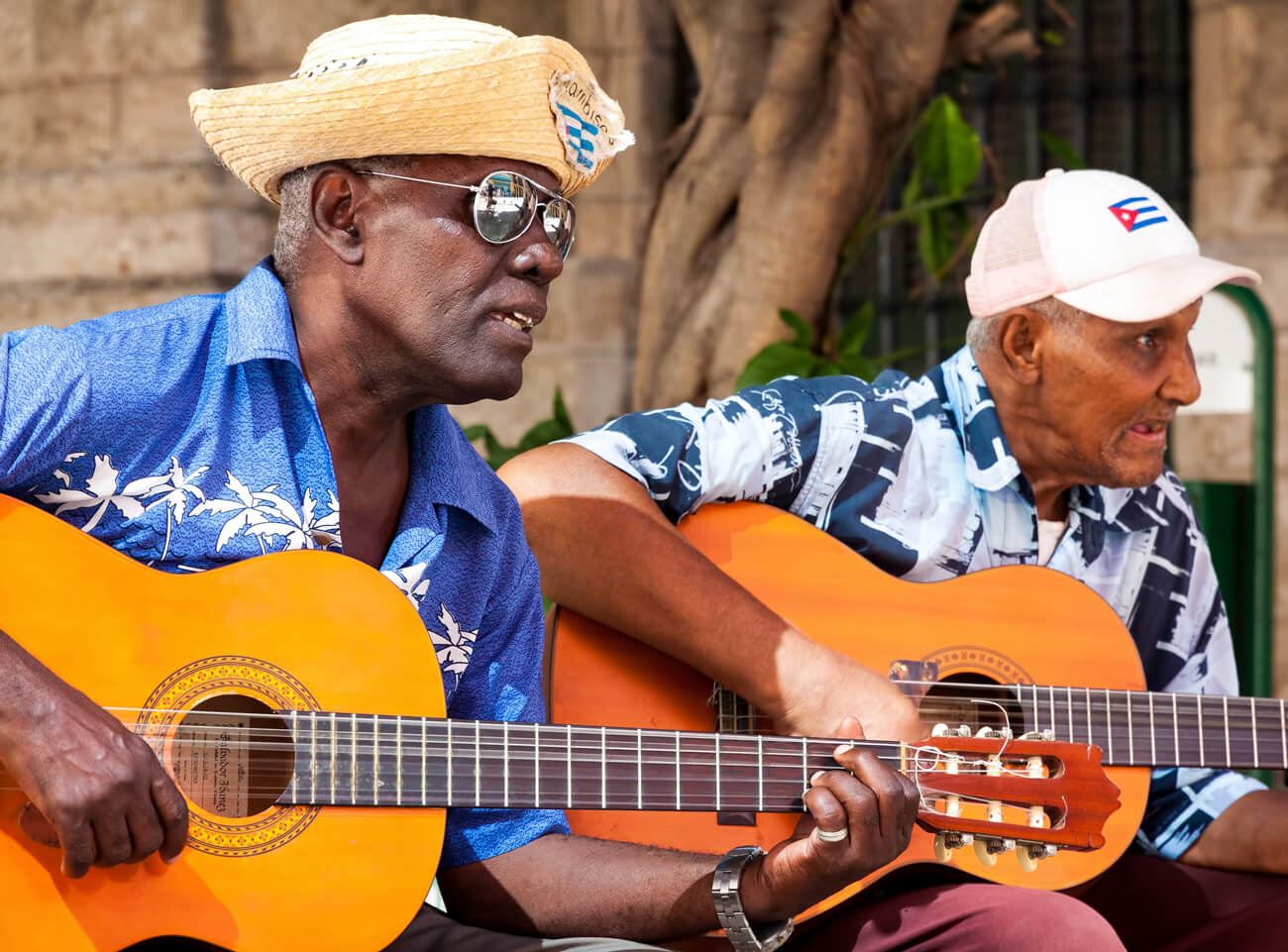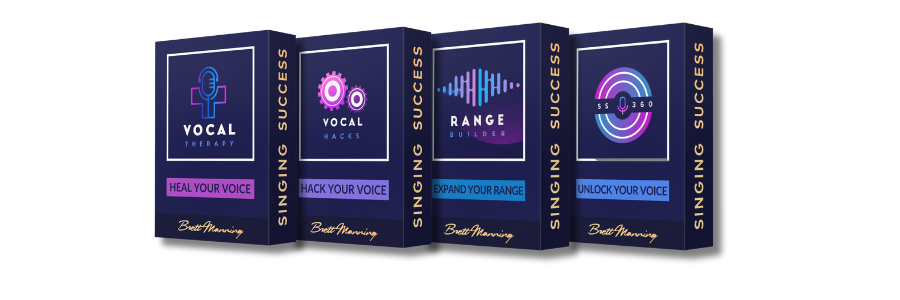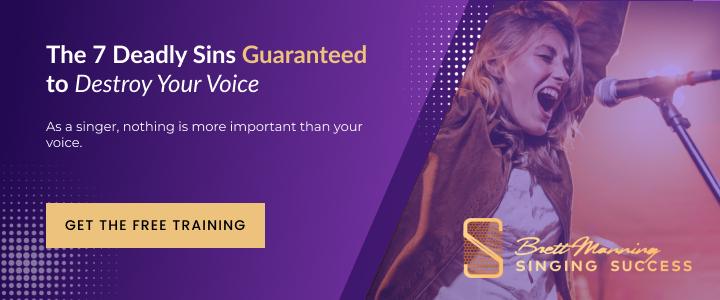Let me give you the short answer first….. ABSOLUTELY. Read on to see the advantages and challenges of singing from a young age or a seasoned age. The fact is we all start singing when listening to the radio, old records (if you’re nostalgic), or your favorite playlist. Voice lessons are a separate issue that I’ll discuss here. Meaning, there’s a difference between those who practice singing on their own, sing just for fun, or learn singing by taking vocal lessons.
Is it Too Late to Learn to Sing?

The year was 1991. I had just gotten married and I was working three part-time jobs. Server, pizza delivery, and part-time sales for Sunrider Int. (whole food concentrate supplements: herbs, teas, formulas to transform health).
Fast-Track Your Success!!

VIP Membership includes:
- Exclusive Facebook Group
- Interact with our vocal coaches–ask them YOUR question
- Live warmups
- Masterclasses and Q&As with Brett Manning and his guests
- SS360 QuickStart Program
- SS360 – The FULL Systematic Vocal Course
- Vocal Hacks
- Range Builder
- Mastering Mix
- Mastering Harmony
- Mastering Vibrato
- Vocal Therapy
- Plus…exclusive content only found here all along the way!
You can struggle on your own, or you can get direct access to the Nashville Coaches who have launched some of the biggest names in the music industry.
Oh…did I mention I was also ‘kind of’ teaching?
I’ll tell you why I didn’t. It’s because it took a lot of nerve for me to say I knew what I was doing and that I was competent, confident, and courageous enough to communicate the methods I’d learned….and….’gulp’…. charge money for my so-called expertise.
When you first start out doing anything this ostentatious, you are a beggar, and beggars can’t be choosers. So here’s what happened…..
 I often teach master classes around the world. Ostensibly…..allegedly…so I’ve been told….I’m kind of funny. Well…looking anyways. 😉 😂
I like to start with, “I was born at a very young age”…. then wait for it. 😂 😂 🤣
My point is that I was born screaming. My first notes (words) were “waaaaaaaah”. And boy was I epic.
I often make the assertion that the intuitive, effortless, glorious screams of a fussy six month old on a LONNNNG plane ride should be recognized for the kid’s awesome voice of steel. We all selfishly want the kid to lose his voice (can you blame us??), but no way! The kid is a rockstar. Another thing I often say in my masterclasses is…..
“All babies are rock stars….and some rock stars are babies” 👶 🎸 🤣
I often teach master classes around the world. Ostensibly…..allegedly…so I’ve been told….I’m kind of funny. Well…looking anyways. 😉 😂
I like to start with, “I was born at a very young age”…. then wait for it. 😂 😂 🤣
My point is that I was born screaming. My first notes (words) were “waaaaaaaah”. And boy was I epic.
I often make the assertion that the intuitive, effortless, glorious screams of a fussy six month old on a LONNNNG plane ride should be recognized for the kid’s awesome voice of steel. We all selfishly want the kid to lose his voice (can you blame us??), but no way! The kid is a rockstar. Another thing I often say in my masterclasses is…..
“All babies are rock stars….and some rock stars are babies” 👶 🎸 🤣
Experiences Teach the Teacher
I had been involved in an elite group of seven musical theater singers in a vocal troupe called “Crimson College” at the University of Utah (go Utes!!). My college mentor, professor, and for many years, my boss, was a genius named James Prigmore. He gave me these first opportunities and even recommended my first real effective coach. So, here I was, twenty five years old. I was teaching my friends and getting startling results, but James—upon seeing what would later prove to be a clear destiny for me—knew I needed to be tested. He sent me a man who was cast out of New York City for a character Role in a professional, well-paid role in ‘My Fair Lady’ for the University’s esteemed ‘equity actors’ Pioneer Memorial Theater. Utah’s Holy Grail for musical theater hopefuls. Richard M., what an actor!!! A resume that took all day to read! I was intimidated, sort of. His voice was extremely beaten up from all the heavy roles and decades of pushing his voice past human limits. He really wasn’t expected to do anything but be a funny, quirky character. PLUS…..this guy was old!!!! In his 70’s but had lived hard. No one expected much. But I did. I knew the structure and function of the vocal cords, the vocal resonators, and the fantastic vocal rehab exercises that I’d learned from the #1 vocal coach in the world. The legendary Seth Riggs. So, I taught only what I knew. In a month of private lessons—three times a week—this gentleman extended his range nearly an octave. Much more than what was needed. We cleaned up about 80% of his rasp and gave him a new voice….even at his old age! Richard was a singer and everyone was shocked! You’re never too old to sing! If you still have breath in your lungs, a heart beat, and ability to communicate, you should take advantage of all the great training that’s available.What Came Next?
James Prigmore had been also teaching me composition, piano, and music theory. His next goal was to send me a young man, David J. who was just past puberty. This was an even tougher test! His voice had gone from a boy soprano to a manly baritone. The cracks and strains in David’s singing voice were a huge challenge. But……I’m a natural athlete, a fighter, and a competitor. And sometimes I don’t know when to quit. In fact too often! This time, tenacity took the vocal training to test! The results were….disastrous! Did that go the way you thought? Nope. But wait….I told him that we need to lighten up his entire voice for six months and that if he started from the very beginning of the tone-making process, and applied his vocal lessons to his speaking voice, and did all of my exercises I’d given him, his vocal skills would HAVE to get better. Small improvements added up. David was a fighter too. He came back after several months and did something I couldn’t believe. He sang well! He’d warmed up already, came into my studio and jumped right in. David would start singing and his voice SOARED up into the male high C. So I gave him harder exercises, worked on style, musical phrasing, and making the right artistic decisions. Two years later….David was singing in a paid production at Pioneer Memorial Theater. No one had any idea about his singing talent because….he had none! Remember this…. “We all have this in common. We all start at the beginning.” Also….there’s a fine line between expressive speech and your singing voice. Something Seth Riggs used to say was…. “If you can talk, you can sing.”How Young is TOO Young?
 I often teach master classes around the world. Ostensibly…..allegedly…so I’ve been told….I’m kind of funny. Well…looking anyways. 😉 😂
I like to start with, “I was born at a very young age”…. then wait for it. 😂 😂 🤣
My point is that I was born screaming. My first notes (words) were “waaaaaaaah”. And boy was I epic.
I often make the assertion that the intuitive, effortless, glorious screams of a fussy six month old on a LONNNNG plane ride should be recognized for the kid’s awesome voice of steel. We all selfishly want the kid to lose his voice (can you blame us??), but no way! The kid is a rockstar. Another thing I often say in my masterclasses is…..
“All babies are rock stars….and some rock stars are babies” 👶 🎸 🤣
I often teach master classes around the world. Ostensibly…..allegedly…so I’ve been told….I’m kind of funny. Well…looking anyways. 😉 😂
I like to start with, “I was born at a very young age”…. then wait for it. 😂 😂 🤣
My point is that I was born screaming. My first notes (words) were “waaaaaaaah”. And boy was I epic.
I often make the assertion that the intuitive, effortless, glorious screams of a fussy six month old on a LONNNNG plane ride should be recognized for the kid’s awesome voice of steel. We all selfishly want the kid to lose his voice (can you blame us??), but no way! The kid is a rockstar. Another thing I often say in my masterclasses is…..
“All babies are rock stars….and some rock stars are babies” 👶 🎸 🤣
My Youngest Student Ever
In 1998, a 7 or 8 month old infant boy lay is his crib, just upstairs from where vocal lessons were being taught all day. This youngster would sing himself to sleep repeating the word ‘nay’ on a descending 5 tone scale. Eventually, he’d learn to talk and start singing Twinkle Little Star and other simple song. And… he was perfectly locked on to each pitch. Maybe he had a slight edge since his dad was in the process of writing and recording the 1st edition of Singing Success! Eventually, he’d be called into my studio from time to time to demonstrate a vocal exercise and we’d only done maybe 2 dozen or so 20 to 30 minute singing lessons. The advantage of learning to sing during younger ages are:- Fewer bad habits
- You can learn how to sing without fear
- Less hard work involved
- Often feels more natural
- Young voices have a more pure sound
- Recognizing ability early can expedite your learning process
- Less attention span
- Voices aren’t as resilient
- Young singers lack discernment about correct technique
- Early singing can ruin a child’s life
- Parents HAVE to be present to protect the child from those with bad motives
- Kids can get burnout pretty quick
Challenges of Learning to Sing at an Older Age
Before we talk about some of the very real struggles of learning to sing later in life, let’s first talk about the advantages….- Life experiences make your singing voice have more character.
- You can afford singing lessons. Even if you can’t, it’s your life and time is limited!
- Your maturity will make you sound more believable.
- You know your own voice and have settled into your sound.
- Chances are you already play an instrument, so you sing and play.
- You’ve heard 10,000 songs already, so you have a bigger repertoire.
- If you’re a songwriter, you have a story to tell.
- You’re your own person, so it’s easier to not care what others think.
- If you’ve been singing out of tune, or you’ve never sung in a choir, karaoke, or even so much as a Happy Birthday, singing lessons will be tough at first. (No one is tone deaf btw.)
- Chances of being a GREAT singer are less and less as you age.
- Performance anxiety can be tough because of life-long expectations.
- High notes aren’t as easy (with certain surprising exceptions) as you age.
- Finding a teacher who is compassionate and believes in you. (My oldest singers have been in their 80’s, including one gentleman who went to a Singing Success retreat who was exactly 80 and became a star of the camp with his amazing Sinatra covers.)
Reduced Vocal Flexibility
As I’ve already mentioned, the vocal cords (also called vocal folds) lose a lot of agility and elasticity, which effects range. But…. there’s some really good news here. Most of my clients—at any age—learn to sing about an octave higher in just a few singing lessons. No matter what age you start singing lessons, you can still increase your range significantly. But the older you are, the more tricky this could be. This is why you need a good singing course to supplement singing lessons. Because a course will allow you to hear a perfect example—in fact, a paradigm—of what solid technique sounds like. Because, in the case of my singing courses, I wanted each person who invested in voice lessons to be able to affordably add extra sessions with inspiring singing voices that cause you to want to learn to sing. In fact, inspiration and coordination beats perspiration.More Difficult to Change Bad Habits
If 1) you’ve had a ton of singing lessons in the past and they weren’t that effective. 2) You’ve sung with singers who strain. 3) You have picked the wrong song 4) You’ve tried learning to sing on your own and you were singing out of tune, THEN you need to get good coaching immediately. Also, singing with a choir (community or church choir) is a great way to sing horribly or much better. I’ll explain… There’s a phenomenon that happens when you sing a song with harmony in a ‘good’ choir. People who lack confidence can lean on an experienced singer with a solid musical ear in your choir…. someone with the best ability to sing in tune without pushing or straining. Conversely, if you try singing next to a ‘self proclaimed’ expert who doesn’t understand how the voice—or more specifically, your voice—and you are asked to sing high notes that are not in your range, you need to kindly say, “I better take this up with my vocal coach. Perhaps we can practice it in our next session or even do it in a different key until I can start singing comfortably in my upper range.” But DON’T let anyone intimidate you or judge you while you’re learning to sing. Make sure you practice songs. And if you decide to play an instrument, practice your singing for 20 or 30 minutes. Then rest your voice while you practice your instrument for an hour or so. Then you can break up your practice time throughout the day or even just 3 or 4 practice sessions a week.Risk of Vocal Strain
 If you feel excess neck, jaw or throat strain while you practice singing, remember this…your singing abilities don’t depend on you singing in a way that is painful. You can rest and work on ear training. Learning music doesn’t have to involve singing non-stop. In fact, listening to great music is another form of practice. Especially when you understand the function of voice and structure of music.
The human voice is a muscle. And if you are in a hurry to learn singing, you will risk overworking. If you were to think about starting a singing career and people were telling you you’re too old to sing. They are half right. Let’s finish that statement…..
“You’re too old to sing…..foolishly.”
Music should bring you joy. The human voice is the only instrument in music that sings words and tells a definitive story.
If you feel excess neck, jaw or throat strain while you practice singing, remember this…your singing abilities don’t depend on you singing in a way that is painful. You can rest and work on ear training. Learning music doesn’t have to involve singing non-stop. In fact, listening to great music is another form of practice. Especially when you understand the function of voice and structure of music.
The human voice is a muscle. And if you are in a hurry to learn singing, you will risk overworking. If you were to think about starting a singing career and people were telling you you’re too old to sing. They are half right. Let’s finish that statement…..
“You’re too old to sing…..foolishly.”
Music should bring you joy. The human voice is the only instrument in music that sings words and tells a definitive story.
How to Learn to Sing as an Adult
Taking Voice Lessons
 As I’ve already stressed, learning to sing on your own can be a risky proposition. Don’t be intimidated by a coach’s client list (My coaches and I have pretty impressive lists), because every coach usually has between 0-5% of his or clients doing music for a living.
As I’ve already stressed, learning to sing on your own can be a risky proposition. Don’t be intimidated by a coach’s client list (My coaches and I have pretty impressive lists), because every coach usually has between 0-5% of his or clients doing music for a living.







